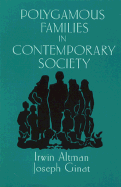Book contents
- Frontmatter
- Contents
- Foreword
- Preface and acknowledgments
- 1 Introduction
- Historical background
- Early stages of relationships
- Home environments of plural families
- Managing everyday life
- Social-emotional and family relationships
- Appendix A Methodology and procedure
- Appendix B Demographics of Mormon polygyny
- Notes
- References
- Index
Managing everyday life
Published online by Cambridge University Press: 05 May 2010
- Frontmatter
- Contents
- Foreword
- Preface and acknowledgments
- 1 Introduction
- Historical background
- Early stages of relationships
- Home environments of plural families
- Managing everyday life
- Social-emotional and family relationships
- Appendix A Methodology and procedure
- Appendix B Demographics of Mormon polygyny
- Notes
- References
- Index
Summary
The three chapters in this section examine day-to-day life in present-day polygynous Mormon families.
Chapter 13 describes systems by which a husband's time is distributed among his wives and families. The so-called “rotation” process can vary from a rigid system in which a husband visits his wives on a strict schedule, to a laissez-faire arrangement wherein his visits do not follow a regular pattern, to a flexible system in which he rotates in a more or less regular routine.
Chapter 14 deals with a crucial day-to-day issue in polygynous Mormon families, namely, how they manage their financial resources. We examine the extent to which a husband and wives operate according to a strictly dyadic system in which each couple deals with finances and income separately, in contrast to a communal system in which family members pool resources and work out their finances collectively.
Chapter 15 examines the ways in which present-day plural families celebrate various events – the birthdays of children, wives, and the husband; wedding anniversaries; and holidays such as Christmas. Are all of these events celebrated communally by a whole family, or are some observed in a dyadic fashion, that is, by each wife and her husband separately from the other wives?
We also examine tensions and stresses in plural families that are associated with dyadic and communal aspects of rotation, budgets, and celebrations.
- Type
- Chapter
- Information
- Polygamous Families in Contemporary Society , pp. 277 - 278Publisher: Cambridge University PressPrint publication year: 1996



